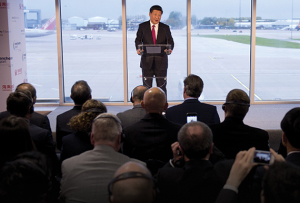 It was a neat, round number that immediately, inevitably drew cynicism. Some £40bn worth of UK-China deals in infrastructure, power, transport and medicine were sealed during last month’s week-long visit by Chinese president Xi Jinping, according to UK Trade and Investment.
It was a neat, round number that immediately, inevitably drew cynicism. Some £40bn worth of UK-China deals in infrastructure, power, transport and medicine were sealed during last month’s week-long visit by Chinese president Xi Jinping, according to UK Trade and Investment.
But if some of the pledges delivered had a familiar ring – an Eden project in China, for instance – it’s not as if the politics of repetition is unprecedented. A first state visit by a Chinese president in a decade was always going to require extraordinary protocol.
But even if the £40bn figure itself had come under the sort of inflationary pressure that geopolitics often demands, the Chinese premier’s visit was the culmination of an extraordinary few months for trade relations between the UK and China, as well as some of its near neighbours. And perhaps most extraordinary of all, the focus was not on London but on the northern powerhouse.
It all began with a successful, but hastily put together, ministerial tour of south-east Asia in July. Diplomatic wheels rolled into motion in Indonesia, Vietnam and, especially, in Singapore and Malaysia. The prime minister led a delegation of business men and women, civil servants and local authority leaders.
The business and energy secretaries of state travelled with David Cameron, as did two further ministers. “Look again at the North of England,” the PM urged assembled VIPs in Singapore and Kuala Lumpur.
In Kuala Lumpur the set-piece event was labelled Beyond Battersea, in recognition of the power station that has drawn most Malaysian investment into the UK so far. It was the first indication that the government was willing to support fine words with diplomatic muscle when it came to promoting the North West and beyond.
And it didn’t end there either. Many of those Far Eastern investors who had heard the PM in Kuala Lumpur or in Singapore were in the UK last month visiting the projects that had been advanced by Leeds and Manchester. Some £750m of trade deals had been signed during the tour. Officials said infrastructure investment would take longer; this return visit was the strongest indication yet that it would come.
In September came a further delegation to China, this time led by chancellor George Osborne, with communities secretary Greg Clark also on board. A specially chartered plane showed that the government meant business.
Legal & General Investment Management head of real assets Bill Hughes had been on the first trip and returned, as did a number of local authority leaders. Sir Michael Bear, chief executive of the UKTI’s Regeneration Investment Organisation, was also back. For Bear, who is also a government special envoy to China, it was the sixth visit of the year to the country.
“The long-term importance of China is undeniable and – regardless of current fluctuations – the development of a strong UK government relationship with the senior leadership of China is essential to our long-term economic future,” he argues.
Again the northern powerhouse was the focus of 50 or so pitches to Chinese developers in Beijing, Shanghai and the Guangzhou/Shenzhen region. Each was sufficiently large to be capable of investing at least £100m in UK projects, with some capable of investing more than £500m.
In Singapore and Malaysia a first pitchbook of investable projects had been hastily assembled. This time it was an altogether more serious affair.
A new £24bn northern powerhouse investment pitchbook was unveiled, highlighting investment opportunities in Manchester, Liverpool, Leeds, Sheffield, Newcastle, Trafford and Cheshire. “The message of strong national and local cohesion was clearly heard and well received by the Chinese audience,” says Bear. And this time real deals began to flow through.
Before he flew home from China the chancellor trumpeted a £60m investment by Hualing Industry and Trade Group in three of Scarborough Group’s projects in Manchester, Leeds and Sheffield with a combined development value of £1.2bn.
By the time the president landed in the UK – and a 100-strong Chinese delegation made a simultaneous visit to MIPIM UK – further details of deals were emerging.
The developer behind the £1.7bn transformation of London’s Royal Albert Dock, ABP, announced it was joining forces with another Chinese giant, CITIC Group. Meanwhile Cameron announced the creation of a new £130m China Cluster within Airport City Manchester to boost the northern powerhouse during a visit to the city with president Xi.
Was this all new? Not really. Scarborough chairman Kevin McCabe, for instance, had been brokering relationships in China for a number of years. Nevertheless this year’s political and business focus will have helped accelerate many of the deals.
For both countries politics matters as much as business. “The focus and interest of the Chinese in the UK continues to increase,” says Bear. “Many of these relationships have already borne fruit, and continued high-level engagement will enable UKTI’s RIO to unlock further business opportunities for the UK.”
And Mi Enhua, chairman of Hualing, told Estates Gazette last week: “[Diplomatic efforts] are very important because if our politicians have good relationships they give us confidence and support. That’s very important. You cannot imagine two countries that have a relationship that’s not going well. How would investors sit in the middle? That would be terrible.”
Make no mistake, 2015 will be seen as the year the northern powerhouse roared into life.











